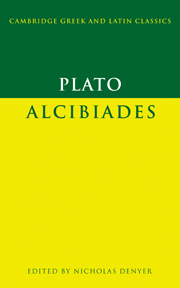Introduction
Published online by Cambridge University Press: 05 June 2012
Summary
ALCIBIADES
In 399 BC, Socrates was tried, convicted, sentenced to death, and executed. One of the charges was ‘he corrupts the young men’. If anything could be used to substantiate this charge of corrupting the young men, it was Socrates' association with the most spectacularly corrupted of them all, Alcibiades.
Alcibiades' beauty (104a), his courage (115d7n.), his high birth (104b), his wealth (104c), his rhetorical prowess (113d6–8n.), his ostentatious affectations (113e9n., 122c1n.), his Olympic victories (105b5–6n., 122d8n.), his debaucheries (12736n.), and even his criminal escapades (106e8n. on νύκτωρ, 118e8n. on ὲγὼ οἶμαι αἴτιος), gave him a glamour that soon won him an influential place in Athenian politics. He entered adult life at about the start of the Peloponnesian War (123d6–7n.), the prolonged and destructive series of conflicts in which the Athenians set themselves against the Spartans, and, ultimately, against more or less all the other Greeks too. He was in his early thirties when, in 421 BC, the Athenians and the Spartans negotiated a peace. According to the treaty, the peace was to last for fifty years (Th. 5.18.3). Alcibiades was soon able to engineer a resumption of hostilities. Among the devices he used was an ingenious double-cross of a Spartan embassy to Athens (Th. 5.45); he here displayed a capacity for winning people's trust, and a readiness to betray it, that were to remain with him throughout his life. The resumed hostilities gave him the opportunity of commanding Athenian and allied forces in the Peloponnese (Th. 5.52.2, 5.55.4, 5.84.1).
- Type
- Chapter
- Information
- Plato: Alcibiades , pp. 1 - 30Publisher: Cambridge University PressPrint publication year: 2001
- 2
- Cited by



